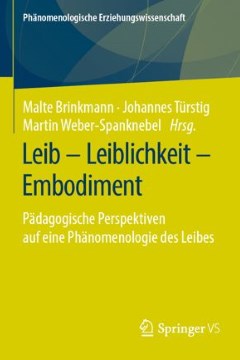Embodied understanding in pedagogical contexts
pp. 21-36
Abstract
In this article, I aim to propose a systematic contribution to Embodied understanding in pedagogical contexts. My article revolves around two questions: How do we understand each other? Can pedagogical understanding be described as a special practice of understanding? To answer these questions, I critically refer to various hermeneutic approaches of understanding (Dilthey, Husserl, Gadamer) and expand them with Heidegger's concept of being-understood. In contrast to these hermeneutic approaches, I then try to open up the "field of expression of the body" in the sense of a hermeneutics of expression. This approach to hermeneutics is not a hermeneutics of linguistic or symbolic expressions or rhetorical forms, but a hermeneutics of intercorporeal symbolism. In the eventful materiality of the body that shows itself, not only a material self-relation announces itself. An Intercorporeal symbolism is rather to be distinguished from a symbolism of cultural orders. It is precisely the materiality of the body in that which is non-sayable that guarantees its presence and its eventfulness—quite in contrast to approaches of understanding of the semiotic.
Publication details
Published in:
Brinkmann Malte, Türstig Johannes, Weber-Spanknebel Martin (2019) Leib – Leiblichkeit – Embodiment: Pädagogische Perspektiven auf eine phänomenologie des Leibes. Dordrecht, Springer.
Pages: 21-36
DOI: 10.1007/978-3-658-25517-6_2
Full citation:
Brinkmann Malte (2019) „Embodied understanding in pedagogical contexts“, In: M. Brinkmann, J. Türstig & M. Weber-Spanknebel (eds.), Leib – Leiblichkeit – Embodiment, Dordrecht, Springer, 21–36.


